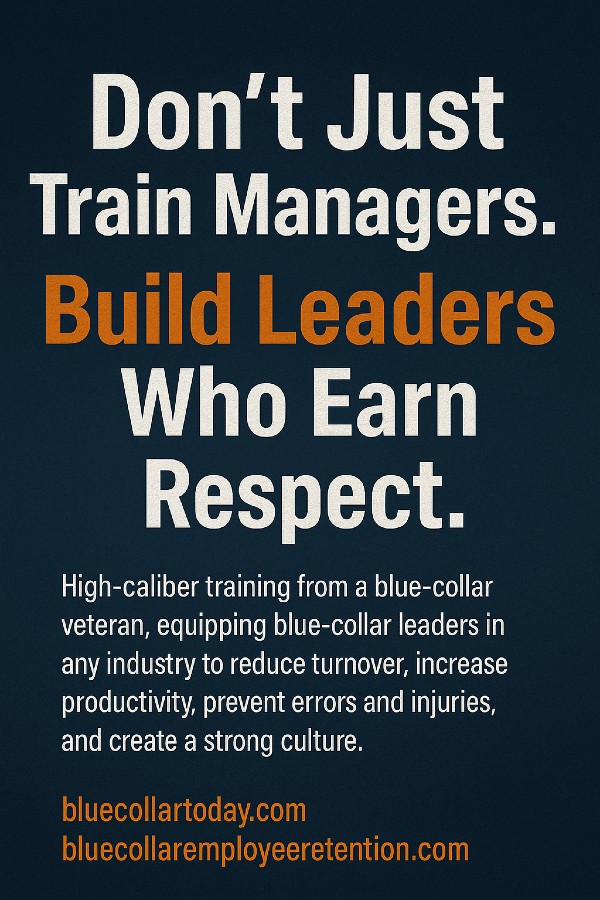
How a Coach with Hands-On Blue-Collar Management Experience Can Help General and Operations Managers Reach Higher Success
In today’s fast-paced industrial landscape, the roles of General Managers (GMs) and Operations Managers are more demanding than ever. Companies require leaders who can boost productivity, strengthen teams, and improve profitability — all while maintaining employee satisfaction and operational safety.
Many organizations invest heavily in leadership development programs, yet few tap into one of the most powerful resources available: Coaching from someone with real-world, hands-on blue-collar management experience.
A coach who has spent years in the trenches — managing teams, balancing budgets, resolving operational crises, and sweating through the day-to-day challenges — brings a unique, practical edge that conventional leadership consultants often lack.
Here’s how such a coach can help today’s GMs and Operations Managers not just succeed, but thrive.
1. Practical Solutions, Not Just Theories
Traditional business coaches often lean heavily on theories, models, and academic frameworks. While valuable, these can fall flat in a high-stress, fast-moving environment like a manufacturing floor, a logistics hub, or a steel plant.
A coach with blue-collar management experience understands how to apply theory to reality. They’ve navigated real-world constraints: tight deadlines, equipment failures, personnel shortages, and demanding customers.
They don’t just talk about leadership – they live it.
This means they offer advice that’s practical, actionable, and tested in environments where success often hinges on the smallest margins.
2. Building Authentic Leadership
Workers in blue-collar industries are often quick to spot inauthenticity.
They respect leaders who have “been there and done that.” A coach with hands-on experience can teach GMs and Operations Managers how to earn credibility with their teams.
This kind of coach shows leaders how to:
- Communicate in a way that connects, not just commands
- Set realistic, motivating expectations
- Balance authority with approachability
- Lead by example under pressure
When leaders are authentic, they inspire loyalty, improve morale, and create high-performing teams — all critical factors in operational success.
3. Sharpening Emotional Intelligence (EQ)
Emotional Intelligence is no longer a “nice-to-have” skill; it’s essential. In high-pressure environments, misunderstandings, resentment, and burnout can cripple an operation.
A blue-collar-experienced coach teaches managers how to:
- Recognize and manage their own stress and emotions
- Read team dynamics accurately
- De-escalate conflicts before they become crises
- Motivate employees with empathy rather than fear
This emotional savvy helps managers create resilient teams that stay productive even when challenges arise.
4. Driving Operational Excellence from the Ground Up
Operations managers are judged by outcomes: productivity, quality, efficiency, and profitability.
A hands-on coach understands what it takes to move the needle on these KPIs — because they’ve done it themselves.
They can guide managers through:
- Lean process improvements without alienating workers
- Implementing safety and compliance measures effectively
- Managing multiple moving parts across departments
- Boosting P&L performance through operational discipline
Importantly, they understand how change initiatives impact real people and can coach managers on introducing improvements without sparking resistance or disengagement.
5. Enhancing Employee Retention and Development
High turnover is costly, especially in industries where skilled labor is critical. A coach with blue-collar leadership experience knows that retention isn’t just about higher pay; it’s about building workplaces where people feel valued.
They teach GMs and Operations Managers how to:
- Create career pathways for frontline employees
- Conduct performance evaluations that truly develop talent
- Foster a culture of respect and recognition
- Identify and mentor future leaders from within
This approach not only improves retention but strengthens the entire organization’s leadership pipeline.
6. Preparing Leaders for Crisis Management
In blue-collar environments, unexpected crises aren’t a possibility — they’re a certainty. Equipment breaks down. Vendors fall through. Weather disrupts schedules.
A hands-on coach trains managers to:
- Stay calm and decisive under pressure
- Prioritize effectively when everything feels urgent
- Communicate clearly to teams and stakeholders during emergencies
- Create contingency plans that actually work in the real world
Being prepared for the worst separates merely good managers from truly great ones.
7. Closing the Gap Between Frontline and Executive Leadership
Many GMs and Operations Managers feel trapped between two worlds: upper management’s strategic goals and frontline realities.
An experienced blue-collar coach understands both sides and can help managers bridge that gap.
They teach how to:
- Translate executive vision into operational tactics
- Advocate for team needs in leadership meetings
- Manage up effectively without losing credibility with the team
- Align operations with broader company goals without sacrificing day-to-day performance
This ability to serve as an effective “translator” is critical for long-term career success.
Conclusion: A Different Breed of Coach for a Different Kind of Leader
Success in today’s industries demands more than strategic thinking and financial acumen. It demands resilience, authenticity, emotional intelligence, and hands-on operational mastery.
A coach who has real-world blue-collar leadership experience doesn’t just prepare managers to hit KPIs — they prepare them to lead thriving teams, drive sustainable results, and build careers they can be proud of. They offer guidance rooted in hard-earned wisdom, not just theory, making them uniquely qualified to help today’s GMs and Operations Managers achieve higher levels of success.
If you want leaders who can win the trust of their teams, navigate tough operational challenges, and drive real-world results, there’s no substitute for a coach who’s truly been there.






